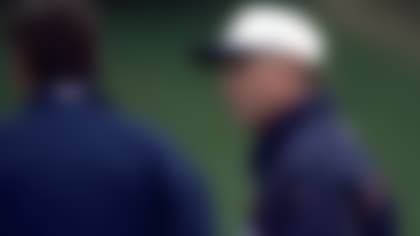Melvin Bullitt was a senior defensive back at Texas A&M in 2006, when Bob Sanders returned from a knee injury to key the Colts' postseason run to the Lombardi Trophy.
Sanders missed all but four games that regular season, but his return in the Colts' wild-card game turned the team's biggest weakness -- a porous run defense that ranked last in the league -- into an impenetrable wall. Behind Sanders' leadership, the Colts allowed an average of just 82.8 rushing yards that postseason.
Rare praise for Colts' defense
If praise comes the Colts' way, it's usually for the guys on the offensive side of the ball. Playing defense for the Colts means accepting your place in the shadows, writes Vic Carucci. **More ...**
Fast forward three years later, and Sanders is again standing on the sidelines. Except this time there's no hope of the former Defensive Player of the Year emerging once again as the Colts' defensive savior. After fighting back from a knee injury that delayed his start this season, Sanders played in just two games before suffering a biceps injury that landed him on injured reserve.
But even without Sanders, Indy's defense is mounting a postseason run that closely resembles their 2006 campaign.
The Colts' 24th-ranked run defense allowed an average of 126.5 rushing yards in the regular season. In two postseason games, they've lowered that average to 86.5.
Unlike 2006, when Indy's defense struggled without Sanders, this Colts secondary has risen to the challenge with younger, less proven guys emerging as playmakers.
"You can talk about a bunch of different guys that at different points in the year made plays for us," Bethea said Wednesday. "It's not one particular person out there you can pinpoint and give all the credit to."
Bethea, of course, is being humble. His teammates would tell you that he is the leader of this secondary, while his partner in crime, Bullitt, has been the perfect ingredient for defensive coordinator Larry Coyer's aggressive defense.
"As far as someone being vocal and playing aggressively, he's picked up that slack" Colts cornerback Jerraud Powers said of Bethea. "Bob was considered the leader of this secondary, but that's Antoine now."
That leadership has been crucial to a guy like Powers, who along with rookie CB Jacob Lacey, has started the majority of games this season. With a pair of rookies playing such a big role in the secondary, it's been up to Bethea and Bullitt to help this unit overcome the loss of Sanders for virtually the entire season.
Where Sanders was the key to stopping the run in 2006, Bullitt's strength comes in his versatility.
"Bob is more of an attack guy; Melvin is just a pure athlete," said Colts cornerback Kelvin Hayden. "He can make tackles. He can cover. He can do it all. Bob and Melvin are different players, but both just as effective."
In many ways, Bullitt's playing style mirrors the team on which he plays. While most would be quick to pigeon-hole this Colts team as a pass-reliant offense and a speed-oriented defense, the beauty is that Indianapolis can win in a variety of ways.
They can win from behind, as they did so dramatically in Week 10 against New England -- perhaps their signature defensive performance of the regular season -- when they trailed by 17 in the fourth quarter.
They beat Miami in Week 2 after possessing the ball for less than 15 minutes and allowing the Dolphins to gain 239 yards on the ground.
And they can win by stopping the run as they demonstrated in the AFC Championship by holding the Jets, the league's best running team, to 86 rushing yards -- nearly half of their regular-season average of 172.2. A week earlier they held the Ravens' fifth-ranked run offense to 87 rushing yards in the divisional playoffs.
"These past two weeks the safeties have been required a lot more in run support," Bullit said. "This week, we'll have to be a little more patient. We'll have to be careful as far as the play-action passes. We won't be able to trigger as fast on the run, maybe play it a little safer.
"We've just got to be prepared, read our keys and stay focused. Not try to make that big play, just let the plays come to you."



